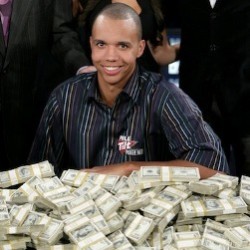Phil Ivey Suffers Wavering Fortunes Since 2012

Since Phil Ivey won three gold bracelets at the 2002 World Series of Poker he has been considered the best all-round player in the world, and the US pro’s current accolades include 10 WSOP bracelets, $23,199,532 in live tournament earnings, as well as a further $19,242,744 won online playing at Full Tilt Poker prior to the site being seized by the US Federal Bureau of Investigation (FBI) on April 15, 2011. After the site reopened in November 2012, however, Phil Ivey’s fortunes have been decidedly on the wane.
2012 Marks A Downswing In Fortunes
After Full Tilt reopened, Phil Ivey has been unable to recapture the form which propelled him to the title of online poker’s biggest winner, and having lost -$252,340 in December 2012, the 39 year old has since gone on to drop -$6,580,384 online overall playing under the screen name ‘Polarizing’. In fact, Ivey has yet to enjoy a single winning year and in 2013 lost -$2,441,773, followed by -$2,372,298 in 2014, and -$1,513,973 so far in 2015.
However, those loses pale into insignificance compared to the £7.7 million ($12.4m) Ivey was unable to collect from Crockfords Casino in Mayfair in August 2012 after being found guilty of edge-sorting over four sessions of punto banco. As judge John Edward Mitting explained at last year’s high profile court case:
“He gave himself an advantage which the game precludes. This is in my view cheating.”
In 2012, Phil Ivey also won a further $9.6 million playing baccarat at the Borgata Hotel Casino & Spa in Atlantic City, but after losing the high-profile court case against Crockfords Casino, the Borgata has also accused Ivey of edge sorting and brought a cheating claim against him, which includes charges of fraud, which could carry a sentence of “more than one year,” and possibly as much as ten years considering the millions of dollars involved. Furthermore, unlike Crockford’s which withheld his “winnings” at the time, Ivey was already paid the $9.6 million by Borgata, money he will now have to shell out if found guilty in court.
Ivey Argues No Wrongdoing
Last year, Ivey argued no wrong-doing in the Crockford’s case and insisted he was ‘legitimately’ taking advantage of the faulty patterns on the back of the casino cards to exploit the system. As he explained at the time:
“I believe that what we did was a legitimate strategy and we did nothing more than exploit Crockfords’ failures to take proper steps to protect themselves against a player of my ability.”
That, of course, was not accepted by the English High Court judge, and this time around Ivey and his fellow defendant Cheng Yin Sun have also failed to convince a US District Judge to throw out the Borgata case. Amongst the points argued for dismissal by Ivey’s lawyer was that the six-month statute of limitations to recover money lost during an “illegal” game had passed, and that in any case the casinos themselves use a whole range of deceptive practices to help patrons to lose their money at the gambling venues. Summing up Ivey’s argument, Judge Noel Hillman cited the following distractions at casinos:
“..loud noises and flashing lights on slot machines, hiding the clocks, making exit signs almost impossible to find, having cocktail waitresses wear revealing clothing, and comping copious amounts of alcohol to ‘loosen up’ their patrons’.”
Judge Denies Bid To Dismiss Borgata Lawsuit
Arguing its case, the Borgata asserted that when Ivey requested that the baccarat dealer turned certain cards 180 degrees for “superstitious” reasons, he was in fact committing fraud as he was only ever seeking to distinguish more easily the back of the playing cards. Consequently, the Borgata is insisting that this then violated New Jersey’s Casino Control Act and transformed the session into an illegal gambling game. However, Phil Ivey’s lawyer is arguing that this issue can only be taken up by the Division of Gaming Enforcement (DGE), which has authority over such issues, and partially accepting this argument, Judge Hillman stated that:
“Borgata indicates that it reported defendants’ alleged conduct to the DGE, but Borgata does not provide any other information on what transpired, if anything, before the DGE. Thus, the Court will deny Borgata’s motion as a procedural matter, but the Court will order Borgata to show cause as to why the Court should not administratively terminate Borgata’s breach of contract and related claims against Ivey.”
Nevertheless, the judge also said that most of the charges should still be permitted to continue, and that the Borgata still had plausible claims for fraud.








